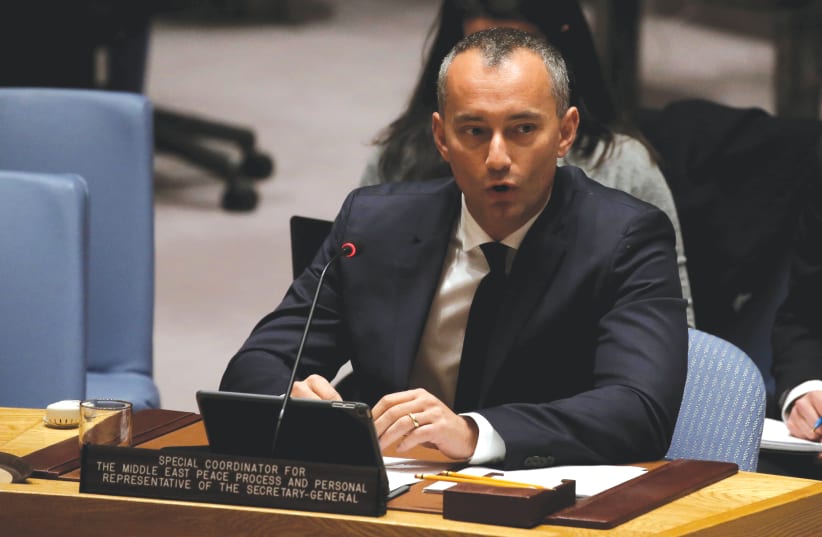The international community cannot afford to ignore the Israeli-Palestinian conflict, outgoing United Nations Special Coordinator for the Middle East Peace Process Nickolay Mladenov said, as he warned against a one-state reality should negotiations between the two peoples not be resumed.“As I depart from this office, I remain firmly convinced that the world cannot leave the situation unattended,” Mladenov told the UN Security Council, which held its monthly meeting on the Israeli-Palestinian conflict on Monday.“For all our collective efforts, the only way forward out of the one-state reality that we increasingly face on the ground is through engagement between the parties and not through violence,” he added.During the five-year period that he has held his office, Mladenov has briefed the council monthly on the situation on the ground. In the coming weeks, Mladenov will take up a new post as UN Special Envoy of the Secretary-General to Libya. He will be replaced by veteran Norwegian diplomat Tor Wennesland.Mladenov said that ‘Wennesland is “one of the most capable diplomats I have ever worked with. I wish him every success in the years ahead and hope that you will extend to him your full support, as you have done to me.”He described three decades of attempted initiatives to resolve the conflict, but said that at the end of the day, the solution must come from Israeli and Palestinians themselves.Israelis and Palestinians have to end the decades of loss and violence by finding a way out of the impasse, Mladenov said.“Palestinians have been upended from their homes, forced to seek refuge across the region. Jews have been upended from across the region, forced to seek refuge in Israel,” he said.“This conflict is not just a conflict over land, for both peoples have the right to call Israel and Palestine their home; it is not only a conflict over history – personal and collective,” Mladenov said. “It is a conflict over the very right of two nations to co-exist”He said that during his five years in office, “I have met almost no Palestinian who doesn’t believe that negotiations are only a façade for the loss of more land. Neither have I met an Israeli who does not believe that every round of negotiations will lead to more violence and terror.”If a final status agreement is not possible at this time, Mladenov said, then at the very least, Israelis and Palestinians with the help of the international community should take small steps.“We all need to work together to protect our societies from radicalization, religious extremism and economic implosion,” the outgoing UN special coordinator said.He referred to the US-brokered Abraham Accords as an initiative that offered new opportunities for the region.There were no negotiations between Israelis and Palestinians during his tenure in the region, Mladenov said, therefore he “worked on upholding the international consensus that the goal is a two-state solution.”In addition, “I have warned of the dangers of the eroding status quo, supported intra-Palestinian reconciliation efforts – and, most of all, focused on preventive diplomacy.”The UN, under his leadership, “together with Egypt, and with critical support from Qatar and others in the international community,” has played a “pivotal role in preventing another devastating war in Gaza.”He both spoke out against injustice to the Palestinians and terror against Israelis.‘I firmly believe that the goal of a just and lasting peace between the Israeli and Palestinian peoples remains achievable through negotiations that can be mediated by the Middle East Quartet and critical Arab partners,” Mladenov said.
Mladenov urges two states, not one as he bid farewell to UNSC
"For all our collective efforts, the only way forward out of the one-state reality that we increasingly face on the ground is through engagement between the parties and not through violence."
